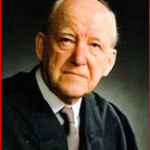Mike Riccardi, in an article entitled “Romans 8 and the Extent of the Atonement: Help from John Murray” writes:
The extent of the atonement continues to be one of those doctrinal discussions that tends to evoke more heat than light. I’ve always found it to be a shame that there is such widespread disagreement in the body of Christ concerning an aspect of theology that is so central to the Gospel itself: the atonement. While differences on the extent of the atonement may be less central than differences on the nature of the atonement, the question, “For whom did Christ atone?” is nevertheless a question that needs to be answered with biblical conviction.
Among the many texts that do get mentioned in these discussions, one text that I’ve very rarely seen discussed in personal conversation is Romans 8:28–39. And yet this text has very significant implications with respect to the particularity or universality of Christ’s redemption. Because, it seems, Romans 8 tends to get lost in the shuffle of exegetical and theological debate related to the L of TULIP, I thought I would reproduce a selection from John Murray’s classic, Redemption Accomplished and Applied, in which he demonstrates the role that Romans 8 plays in this discussion.
He asks the question, “Is there not also more direct evidence provided by the Scripture to show the definite or limited extent of the atonement?” and answers, “There are indeed many biblical arguments.” The first he addresses is Romans 8:31–39.
* * * * *
There is no question but that on two occasions in this passage, explicit reference is made to the death of Christ—“he that spared not his own Son but delivered him up for us all” (ver. 32) and “Christ Jesus is the one who died, yea rather is raised up” (ver. 34). Hence, any indication given in this passage respecting extent would be pertinent to the question of the extent of the atonement.
Verses 31–32: The “us” is conditioned by vv. 28–30
In verse 31 Paul asks the question: “What shall we then say to these things? If God is for us, who is against us?” We are compelled to ask the question: of whom is Paul speaking? In other words, what is the denotation of the expressions “for us” and “against us”?
The answer is that the denotation cannot be other than that provided by the preceding context, namely, those spoken of in verses 28–30. It would be impossible to universalize the denotation of verse 31 if we are to think biblically, and it would be exegetically monstrous to break the continuity of Paul’s thought and extend the reference of verse 31 beyond the scope of those spoken of in verse 30. This means therefore that the denotation in view in the words “for us” and “against us” in verse 31 is restricted, and restricted in terms of verse 30.
When we proceed to verse 32 we find that Paul again uses this expression “for us” and adds the word “all”—“he that spared not his own Son but delivered Him up for us all.” Here he is dealing expressly with those on whose behalf the Father delivered up the Son. And the question is: what is the scope of the expression, “for us all”?
It would be absurd to insist that the presence of the word “all” has the effect of universalizing the scope. The “all” is not broader than the “us.” Paul is saying that the action of the Father in view was on behalf of “all of us” and the question is simply the scope of the “us.”
The only proper answer to this question is that the “us” in view in verse 32 is the “us” in view in verse 31. It would be doing violence to the most elementary rules of interpretation to suppose that at verse 32 Paul had broadened the scope of those to whom he is speaking and included many more than he included in the protestation of verse 31. In fact Paul is continuing his protestation and saying that not only is God for us but will also freely give us all things. And the guarantee of this resides in the fact that the Father gave up his Son on our behalf.
Verse 32: Christ died for those who receive all things from the Father
Lest there should be any doubt as to the restricted denotation of the words, “for us all”’ in verse 32, it is well to be reminded that the giving up of the Son is correlative with the free bestowal of all good gifts. We may not extend the scope of the sacrifice of the Son beyond the scope of all the other free gifts—every one on whose behalf the Father delivered up the Son becomes the beneficiary of all other gifts of grace. To put it briefly, those contemplated in the sacrifice of Christ are also the partakers of the other gifts of saving grace— “how shall he not with him also freely give us all things?”
Verse 33: The “us” is “God’s elect”
When we proceed to verse 33 the restrictive scope becomes unquestionably patent. For Paul says: “who will bring a charge against the elect of God? God is the one who justifies: who is he who condemns?” The thought moves strictly within the orbit defined by election and justification, and the reference to election and justification harks back to verses 28–30 where predestination and justification are shown to be coextensive.
Verse 34: Christ intercedes for all whom He died for
At verse 34 Paul again refers to the death of Christ. He does so in a way that is significant for our present interest in two respects.
His appeal to the death of Christ is coordinated with the fact that it is God who justifies. And he does this for the purpose of vindicating the elect of God against any charge that might be brought against them and to support his challenge, “who shall lay a charge against the elect of God?” It is the elect and the justified that Paul has in mind here in his appeal to the death of Christ, and there is no reason for going outside the denotation provided by election and justification when we seek to discover the extent of Christ’s sacrificial death.
The second respect in which his reference here to the death of Christ is significant is that he appeals to the death of Christ in the context of its sequel in the resurrection, the session at the right hand of God, and the intercession on our behalf. Again Paul uses this expression “for us” and he uses it now in connection with intercession—“who also makes intercession for us.”
Rom 8;34 Two observations bear directly upon our question. First, the expression “for us” in this case must be given the restricted denotation which we found already in verse 31. It is impossible to universalize it not only because of the restrictive scope of the whole context but also because of the very nature of intercession as availing and efficacious.
Second, because of the way in which the death, resurrection, and intercession of Christ are coordinated in this passage, it would be quite unwarranted to give to the death of Christ a more inclusive reference than is given to his intercession. When Paul says here, “it is Christ that died,” he of course means that “Christ died for us,” just as in verse 32 he says that the Father “delivered him up for us all.” We cannot give wider scope to the “for us” implied in the clause, “it is Christ that died” than we can give to the “for us” expressly stated in the clause, “who also makes intercession for us.” Hence we see that we are led into impossible suppositions if we try to universalize the denotation of those referred to in these passages.
Verses 35–39: Atoning love ensures eternal security
Finally, we have the most cogent consideration of all. “Who shall separate us from the love of Christ? . . . For I am persuaded that neither death nor life nor angels nor principalities nor things present nor things to come nor powers nor height nor depth nor any other creature will be able to separate us from the love of God which is in Christ Jesus our Lord” (Rom 8:35–39). Paul is here affirming in the most emphatic way, in one of the most rhetorical conclusions of his epistles, the security of those of whom he has been speaking. The guarantee of this security is the love of God which is in Christ Jesus. And the love of God here spoken of is undoubtedly the love of God towards those who are embraced in it.
Now the inevitable inference is that this love from which it is impossible to be separated and which guarantees the bliss of those who are embraced in it is the same love that must be alluded to earlier in the passage when Paul says, “He that spared not his own Son but delivered him up for us all, how shall he not with him also freely give us all things?” (ver. 32). It is surely the same love, called in verse 39 “the love of God which is in Christ Jesus,” that constrained the Father to deliver up his own Son. This means that the love implied in verse 32, the love of giving the Son, cannot be given a wider reference than the love which, according to verses 35–39, insures the eternal security of those who are its objects. If not all men enjoy this security, how can that which is the source of this security and the guarantee of its possession embrace those who enjoy no such security?
We see, therefore, that the security of which Paul here speaks is a security restricted to those who are the objects of the love which was exhibited on Calvary’s accursed tree, and therefore the love exhibited on Calvary is itself a distinguishing love and not a love that is indiscriminately universal. It is a love that insures the eternal security of those who are its objects and Calvary itself is that which secures for them the justifying righteousness through which eternal life reigns. And this is just saying that the atonement which Calvary accomplished is [particular, and] not universal.
* * * * *
Update: For the sake of capturing Murray’s argument, here’s my attempt at a summary:
(1) Based on Romans 8:32, Murray argues that all for whom Christ was delivered over will, along with Christ, be given “all things” by the Father. “All things” is understood as all the saving benefits of God’s grace. I think all sides would agree on this. Since the non-elect do not receive all the saving benefits of God’s grace (e.g., rescue from eternal punishment indeed), they are not included in the “us all” for whom Christ was delivered over.
(2) Based on the fact that, in Romans 8:33, Paul identifies the “us all” for whom Christ was delivered over to be “God’s elect,” Murray argues that Christ was not delivered over for those who are non-elect.
(3) Based on Romans 8:34, Murray argues that all for whom Christ was delivered over will also be the beneficiaries of His present intercessory ministry at the Father’s right hand. Since Christ is not presently interceding before the Father on behalf of the non-elect, they are not included in the “us all” for whom Christ was delivered over.
(4) Based on Romans 8:35–39, Murray argues that all for whom Christ was delivered over enjoy the blessedness of eternal security; they cannot be separated from the love of Christ. Since the non-elect will in fact be separated from the love of Christ as they perish for their sins in hell, they are not included in the “us all” for whom Christ was delivered over.
Some have responded by arguing to this effect: “Yes, Paul is speaking of those for whom Christ died in Romans 8, but he’s not speaking of all for whom Christ died. Christ died for others (namely, the non-elect) as well; but he’s just not speaking about them here. However, Paul’s universalistic language in this text rules that out. It is almost tautological to say that, when Paul speaks of the “us all” for whom Christ was delivered over, He is speaking of all for whom Christ was delivered over. If Paul meant to be referring only to a subset of those for whom Christ died, why would he use the universalistic language, “us all”? Why wouldn’t he just say, “for us,” or something equivalent?
Indeed, it would undermine the express purpose of Paul’s entire argument in Romans 8:31–39 to suggest that the “us all” could be referring only to a subset of those for whom Christ died. His argument is to give encouragement and assurance to those who are beneficiaries of the atoning sacrifice of Christ by speaking of the benefits that accrue to them from His death. If not everyone for whom He died is guaranteed those benefits, why make His death the basis for his encouragement and their assurance? It would be no comfort, since the troubled saints could simply respond, “What does Christ’s death have to do with my security? He died for everyone without exception, and millions are separated from Christ’s love!” This means that the “us all” in this passage refers to everyone for whom Christ was delivered over.
So the argument can be represented this way:
(a) the “us all” refers to everyone for whom Christ was delivered over;
(b) everyone for whom Christ was delivered over receives all the Father’s saving blessings;
(c) everyone for whom Christ was delivered over benefit from Christ’s present intercession in heaven;
(d) no one for whom Christ was delivered over can ever be separated from Christ’s love;
(e) (b) through (d) cannot be said of the non-elect;
therefore
(f): Christ was delivered over for the elect alone.
 In 1525, Luther responded to Erasmus’ ‘little book’ with, what one writer called, ‘a bomb’. The title of Luther’s book says it all, De servo arbitrio,’The Bondage of the Will’.
In 1525, Luther responded to Erasmus’ ‘little book’ with, what one writer called, ‘a bomb’. The title of Luther’s book says it all, De servo arbitrio,’The Bondage of the Will’.



